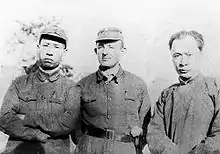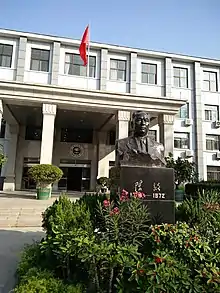Chen Yi (marshal)
Chen Yi (Chinese: 陈毅; pinyin: Chén Yì; Wade–Giles: Chen I; August 26, 1901 – January 6, 1972) was a Chinese communist military commander and politician. He served as Mayor of Shanghai from 1949 to 1958 and as Foreign Minister of China from 1958 to 1972.
Chen Yi | |
|---|---|
陈毅 | |
.jpg.webp) | |
| 8th Mayor of Shanghai | |
| In office 1949–1958 | |
| Preceded by | Zhao Zukang |
| Succeeded by | Ke Qingshi |
| 2nd Foreign Minister of the People's Republic of China | |
| In office 1958–1972 | |
| Premier | Zhou Enlai |
| Deputy | Luo Guibo |
| Preceded by | Zhou Enlai |
| Succeeded by | Ji Pengfei |
| 2nd Secretary of the CPC Shanghai Committee | |
| In office 1950–1954 | |
| Preceded by | Rao Shushi |
| Succeeded by | Ke Qingshi |
| 1st President of the China Foreign Affairs University | |
| In office 1955–1969 | |
| Preceded by | none |
| Succeeded by | Liu Chun Closed until 1980 |
| Personal details | |
| Born | 26 August 1901 Lezhi County, Sichuan, Qing dynasty China |
| Died | 6 January 1972 (aged 70) Beijing, People's Republic of China |
| Spouse(s) | Xiao Juying (萧菊英)
(m. 1930; death 1932)Lai Yueming (赖月明) (m. 1932)Zhang Qian (张茜) (m. 1940) |
| Children | Chen Haosu, Chen Xiaolu |
| Awards |
|
| Military service | |
| Nickname(s) | Poet Marshal |
| Allegiance | |
| Branch/service | People's Liberation Army |
| Years of service | 1927–1972 |
| Rank | Marshal of People's Republic of China |
| Commands | Commander-in-Chief, Eastern China Field Army, Deputy Commander-in-Chief, Central China Field Army |
| Battles/wars | Northern Expedition, Long March, Hundred Regiments Offensive, Chinese Civil War |
Biography
Chen was born in Lezhi County near Chengdu, Sichuan, into a moderately wealthy magistrate's family.


A comrade of Lin Biao from their guerrilla days, Chen was a commander of the New Fourth Army during the Sino-Japanese War (1937-1945), spearheaded the Shandong counter-offensive during the Chinese Civil War, and later commanded the Communist armies that defeated the KMT forces during the Huaihai Campaign and conquered the lower Yangtze region in 1948–49. He was made a Marshal of the People's Liberation Army (PLA) in 1955.
After the founding of the People's Republic of China, Chen became mayor of Shanghai. He also served as vice premier from 1954 to 1972 and foreign minister from 1958 to 1972 and president of the China Foreign Affairs University from 1961 to 1969. As vice premier, he was present during the breakup of Sino-Soviet relations. In August 1960, Chen Yi attempted to ease tensions with the Soviets, declaring on one instance to the Soviet Ambassador to Beijing that Moscow should stop "severing the friendship between the two nations," and two weeks later to the Soviet deputy foreign minister that Moscow and Beijing should both try to save the alliance.[2] During the Cultural Revolution, he was criticized in 1967, but never dismissed, so Zhou Enlai performed the duties of foreign minister in his place. He was a member of the 8th CPC Politburo from 1956 to 1967 but was not admitted to the 9th Politburo (1969), though he was a member of the 9th CPC Central Committee.
After Marshal Lin Biao's death in 1971, he was restored to favour, although not to his former power. Mao Zedong attended Chen's funeral in 1972.[3] This was Mao's last public appearance and his first appearance at anyone's funeral during the Cultural Revolution.
See also
- List of officers of the People's Liberation Army
References
- maokaikai, ed. (7 January 2016). "陈毅的子女后代 陈毅有几位妻子" [The descendants of Chen Yi. How many wives did Chen Yi have?]. Archived from the original on 11 February 2017. Retrieved 9 February 2017.
- Shu Guang Zhang, 2010, The Sino-Soviet alliance and the Cold War in Asia, 1954-1962. The Cambridge History of the Cold War, Vol 1, p.371.
- Perlez, Jane (6 December 2013). "A Leader in Mao's Cultural Revolution Faces His Past". New York Times. Retrieved 26 December 2013.
External links
| Wikimedia Commons has media related to Chen Yi. |
- Long March Leaders: Chen Yi (by Paul Noll)
- 陈毅纪念馆 (Chen Yi memorial site; (in Chinese))
- 诗人元帅——陈毅 (The poet-general Chen Yi; (in Chinese))
- Handbook for the Chinese Civil War (US Naval War College)
| Government offices | ||
|---|---|---|
| Preceded by Zhao Zukang |
Mayor of Shanghai 1949–1958 |
Succeeded by Ke Qingshi |
| Preceded by Zhou Enlai |
Foreign Minister of the People's Republic of China 1958–1972 |
Succeeded by Ji Pengfei |
| Party political offices | ||
| Preceded by Rao Shushi |
Secretary of the CPC Shanghai Committee 1950–1954 |
Succeeded by Ke Qingshi |
| Academic offices | ||
| New title | President of the China Foreign Affairs University 1955–1969 |
Succeeded by Liu Chun Closed until 1980 |